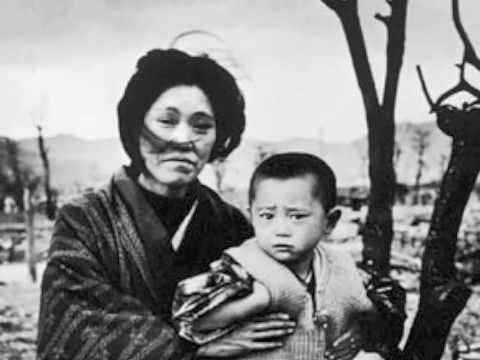Just saw the much-hyped Hollywood film “Oppenheimer”.
I hope to write more about it, the media hype around it, its uses and misuses — and the wider subject of scientists in society which has occupied much of my thinking the last three years.
But my initial thought is how remarkably it is that the film plays Harry Truman’s statement following the atomic bombing of Japan but then omits his claim:
The world will note that the first atomic bomb was dropped on Hiroshima, a military base. That was because we wished in this first attack to avoid, insofar as possible, the killing of civilians.
The film — if I caught it right — cuts the above quote just after the word “Hiroshima” so that the false claim is omitted.
Above is the song “Enola Gay” by OMD.
You should have stayed at home yesterday
Ah-ha, words can't describe
The feeling and the way you lied
These games you play
They're going to end in more than tears some day
Ah-ha Enola Gay
It shouldn't ever have to end this way …
This version, done in 2009, by my old friend and love Elisa Salasin, includes audio of Oppenheimer quoting the Bhagavad Gita: “I am become Death, the destroyer of worlds” — which is dramatically highlighted twice in the film, including once with his lover. And it includes Truman’s claim: “The world will note that the first atomic bomb was dropped on Hiroshima, a military base.”
This is part of how propaganda works: a Big Lie is told and the liar not called out -- in this case, not even now in a film presumably critical of him.
The above video by Elisa shows the effects of the bombing. The film “Oppenheimer” has lots of sophisticated visuals, but shows none of the reality of it.
Along similar lines, see interview with historian Gar Alperovitz, author of The Decision to Use the Atomic Bomb, with Andrew Cockburn, “A Few Things ‘Oppenheimer’ Leaves Out” —
Was it important for U.S. foreign policy going forward to convince the country and the world we had not done a bad thing but a good thing by ending the war and saving lives?
Yes, on two levels. Hiroshima and Nagasaki were not military targets. That’s why they had not been attacked, because they were so low in the priority list. So who was there? There were a few small military installations. The young men were at war, but who was left behind? Minimally, about 300,000 people—predominantly children, women, and old people—who were unnecessarily destroyed.
It’s an extraordinary moral challenge to the whole position of the United States and to the decision-makers who made those decisions. If you don’t justify that decision somehow, you really are open to extreme criticism, and justly and rightly so.
I should add that I believe the audio in the film is the one from above, it sounded like it to me. But that statement is from August 9. My friend Wade Frazier notes that there was an earlier statement on August 6, the day Hiroshima was bombed, which may well have been the one in the film. But the same false claim was made at the beginning of that: “Sixteen hours ago an American airplane dropped one bomb on Hiroshima, an important Japanese Army base.”
Interesting regarding the August 9 statement, Wade notes that Truman did not specifically approve the Nagasaki bombing which took place that day and was surprised by it, and the next day, August 10, he personally ordered a stop to the bombing, and demanded that he approve any further bombings. This is even noted in mainstream accounts like this New Yorker piece. That’s just one of many things that’s remarkably omitted from a film that presumes to examine the intersection of science, militarism and politics.
The audio is based on the SASH! remix of the OMD original.




Thanks for that information. I will go to a screening on Wed. A few things
1. They took Hiroshima and Nagasaki off the list of cities being firebombed so they could investigate the pure effects of the atomic bombing in their sick science experiment.
2. Enola Gay is the name of the pilot, Paul Tibbits, Jr's mother
3. Truman said, "Having found the atomic bomb, we have used it. We shall continue to use it. . . . It is an awful responsibility which has come to us. We thank God that the atomic bomb has come to us instead of to our enemies, and we pray that God may guide us to use it in his ways and for his purposes.”
The suggestion that we might have demonstrated the bomb on a remote atoll, and ended the war, never occurred to me until I read about it recently. I wonder if Truman considered that?